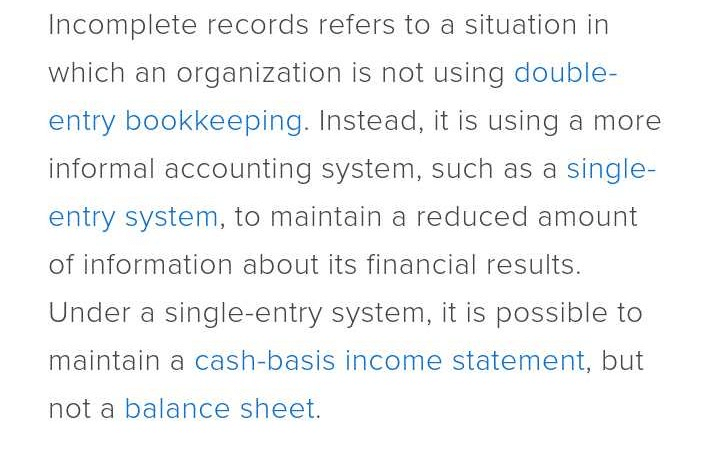Commerce Exam > Commerce Questions > What is incomplete records and how it is used...
Start Learning for Free
What is incomplete records and how it is used?
Verified Answer
What is incomplete records and how it is used?
Incomplete records refers to a situation in which an organization is not using double-entry bookkeeping. Instead, it is using a more informal accounting system, such as a single-entry system, to maintain a reduced amount of information about its financial results.
 This question is part of UPSC exam. View all Commerce courses
This question is part of UPSC exam. View all Commerce courses
Most Upvoted Answer
What is incomplete records and how it is used?

Community Answer
What is incomplete records and how it is used?
Incomplete records refers to a situation in which an organization is not using double-entry bookkeeping. Instead, it is using a more informal accounting system, such as a single-entry system, to maintain a reduced amount of information about its financial results. Under a single-entry system, it is possible to maintain a cash-basis income statement, but not a balance sheet.
It is also possible that the managers of a business intend to maintain a double-entry bookkeeping system, but the underlying accounting records are incomplete. There are many reasons for this situation, including the following:
- Fraudulent behavior. Employees may deliberately obfuscate or never record certain transactions, so that they can abscond with company assets or record excessive levels of profitability.
- Inadequate systems. There may be an inadequate system of procedures and supporting controls in place, so that various business transactions are never recorded in the accounting system.
- Loss during transition. A company may not adequately protect its old records when moving to a new accounting system, and irretrievably loses some or all of the old records.

|
Explore Courses for Commerce exam
|

|
Similar Commerce Doubts
What is incomplete records and how it is used?
Question Description
What is incomplete records and how it is used? for Commerce 2025 is part of Commerce preparation. The Question and answers have been prepared according to the Commerce exam syllabus. Information about What is incomplete records and how it is used? covers all topics & solutions for Commerce 2025 Exam. Find important definitions, questions, meanings, examples, exercises and tests below for What is incomplete records and how it is used?.
What is incomplete records and how it is used? for Commerce 2025 is part of Commerce preparation. The Question and answers have been prepared according to the Commerce exam syllabus. Information about What is incomplete records and how it is used? covers all topics & solutions for Commerce 2025 Exam. Find important definitions, questions, meanings, examples, exercises and tests below for What is incomplete records and how it is used?.
Solutions for What is incomplete records and how it is used? in English & in Hindi are available as part of our courses for Commerce.
Download more important topics, notes, lectures and mock test series for Commerce Exam by signing up for free.
Here you can find the meaning of What is incomplete records and how it is used? defined & explained in the simplest way possible. Besides giving the explanation of
What is incomplete records and how it is used?, a detailed solution for What is incomplete records and how it is used? has been provided alongside types of What is incomplete records and how it is used? theory, EduRev gives you an
ample number of questions to practice What is incomplete records and how it is used? tests, examples and also practice Commerce tests.

|
Explore Courses for Commerce exam
|

|
Signup for Free!
Signup to see your scores go up within 7 days! Learn & Practice with 1000+ FREE Notes, Videos & Tests.


























